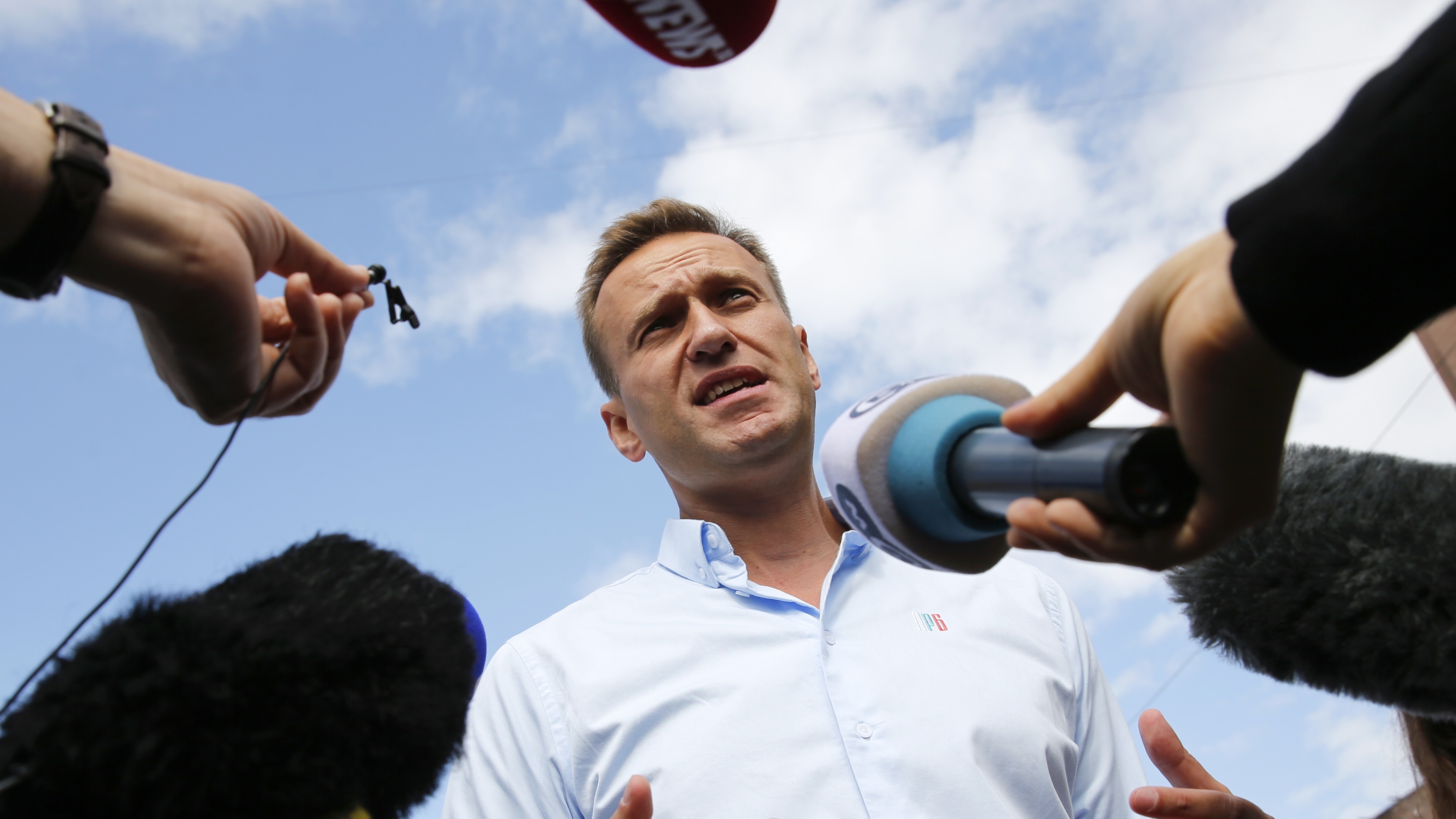Alexei Navalny poisoned with negroni after being ‘tailed by hit squad’
Reports say the FSB squad had been tracking Navalny since 2017

A free daily email with the biggest news stories of the day – and the best features from TheWeek.com
You are now subscribed
Your newsletter sign-up was successful
Russian intelligence agents followed Alexei Navalny for years before poisoning him with the nerve agent novichok in August, it has been revealed.
A joint investigation between Bellingcat and Russian news site The Insider found that an undercover hit squad working for Russia’s FSB spy agency poisoned the vocal critic of Vladimir Putin, having shadowed him on multiple previous trips
Citing “voluminous” telecoms and travel data, Bellingcat reports that the FSB squad had been tailing Navalny since 2017, around the same time that he announced that he would run for president against Putin.
The Week
Escape your echo chamber. Get the facts behind the news, plus analysis from multiple perspectives.

Sign up for The Week's Free Newsletters
From our morning news briefing to a weekly Good News Newsletter, get the best of The Week delivered directly to your inbox.
From our morning news briefing to a weekly Good News Newsletter, get the best of The Week delivered directly to your inbox.
The investigative news site said it believes the August poisoning had been approved “at the highest echelons of the Kremlin”, appearing to confirm Navalny’s claim that Putin had ordered the attempted assassination.
The investigation website found that three men travelled with the opposition figure to Tomsk, where he was eventually poisoned. It names the three men as doctors Alexey Alexandrov and Ivan Osipov, and Vladimir Panyaev.
The report, conducted with the assistance of CNN and German magazine der Spiegel, also suggests that the method of poisoning may have been a cocktail ordered by Navalny in Tomsk.
The activist is reported to have ordered a Bloody Mary while meeting colleagues for a drink in his hotel, but having been informed that the hotel did not have the ingredients, opted for a negroni at the suggestion of the bartender. He later told an interviewer that it “tasted like the most disgusting thing I’ve had in my life”. He fell ill the next morning.
A free daily email with the biggest news stories of the day – and the best features from TheWeek.com
“Russia’s response… is almost certain to follow the familiar pattern of denial, mockery and often absurd attempts at obfuscation,” writes The Times’ Moscow correspondent Marc Bennetts. And while it may see the UK and EU “increase sanctions on Russia”, it is “unlikely to have much impact on Putin’s reputation” within the country, he adds.
Joe Evans is the world news editor at TheWeek.co.uk. He joined the team in 2019 and held roles including deputy news editor and acting news editor before moving into his current position in early 2021. He is a regular panellist on The Week Unwrapped podcast, discussing politics and foreign affairs.
Before joining The Week, he worked as a freelance journalist covering the UK and Ireland for German newspapers and magazines. A series of features on Brexit and the Irish border got him nominated for the Hostwriter Prize in 2019. Prior to settling down in London, he lived and worked in Cambodia, where he ran communications for a non-governmental organisation and worked as a journalist covering Southeast Asia. He has a master’s degree in journalism from City, University of London, and before that studied English Literature at the University of Manchester.
-
 The broken water companies failing England and Wales
The broken water companies failing England and WalesExplainer With rising bills, deteriorating river health and a lack of investment, regulators face an uphill battle to stabilise the industry
-
 A thrilling foodie city in northern Japan
A thrilling foodie city in northern JapanThe Week Recommends The food scene here is ‘unspoilt’ and ‘fun’
-
 Are AI bots conspiring against us?
Are AI bots conspiring against us?Talking Point Moltbook, the AI social network where humans are banned, may be the tip of the iceberg
-
 What happens now that the US-Russia nuclear treaty is expiring?
What happens now that the US-Russia nuclear treaty is expiring?TODAY’S BIG QUESTION Weapons experts worry that the end of the New START treaty marks the beginning of a 21st-century atomic arms race
-
 Epstein files topple law CEO, roil UK government
Epstein files topple law CEO, roil UK governmentSpeed Read Peter Mandelson, Britain’s former ambassador to the US, is caught up in the scandal
-
 Iran and US prepare to meet after skirmishes
Iran and US prepare to meet after skirmishesSpeed Read The incident comes amid heightened tensions in the Middle East
-
 Israel retrieves final hostage’s body from Gaza
Israel retrieves final hostage’s body from GazaSpeed Read The 24-year-old police officer was killed during the initial Hamas attack
-
 China’s Xi targets top general in growing purge
China’s Xi targets top general in growing purgeSpeed Read Zhang Youxia is being investigated over ‘grave violations’ of the law
-
 Ukraine, US and Russia: do rare trilateral talks mean peace is possible?
Ukraine, US and Russia: do rare trilateral talks mean peace is possible?Rush to meet signals potential agreement but scepticism of Russian motives remain
-
 Panama and Canada are negotiating over a crucial copper mine
Panama and Canada are negotiating over a crucial copper mineIn the Spotlight Panama is set to make a final decision on the mine this summer
-
 Why Greenland’s natural resources are nearly impossible to mine
Why Greenland’s natural resources are nearly impossible to mineThe Explainer The country’s natural landscape makes the task extremely difficult